七年级下句型转换(一般过去时)
- 格式:doc
- 大小:32.50 KB
- 文档页数:3

一般过去时易错点解析例1. 用括号内动词的适当形式填空I went to the supermarket and (buy) some fruit.解析:很多同学在做此题时,由于没有找到时间状语,因而不知道应该填什么。
句中的and连接了两个并列句,前后时态应该一致,前面用了go的过去时went,所以后面buy也应该用过去时bought.答案:bought例2. 用括号内动词的适当形式填空。
He always (play) computer games last year.解析:有些人会把答案写成plays,虽然主语He是单数第三人称,而且句子中出现了always,但是当你读完整个句子就会发现last year,所以应该用过去时played。
一般过去时也可以表示过去经常做某事。
答案:played例3. 用括号内动词的适当形式填空。
Our teacher said that the earth (move) round the sun.解析:此题是一道难题。
本句是含有宾语从句的主从复合句。
主句的谓语动词said是say的过去式,有的同学可能会填moved,但是从句the earth moves round the sun(地球绕着太阳转)是客观真理,所以还是要用一般现在时。
答案:moves例4. 句型转换。
Miss Green taught us English last year.(变一般疑问句)解析:此题有的同学可能会写成:Did Miss Green taught you English last year?要注意,如果变一般疑问句时提前了Did,那么原句中的实意动词要恢复成原形。
可记住如下口诀:“见助动,周原形〞。
答案:Did Miss Green teach you English last year?例5. 单项选择。
( )There a pen and two books on the desk yesterday.A. isB. areC. wasD. were解答:由yesterday可知此题应该选择过去时,可排除A和B。
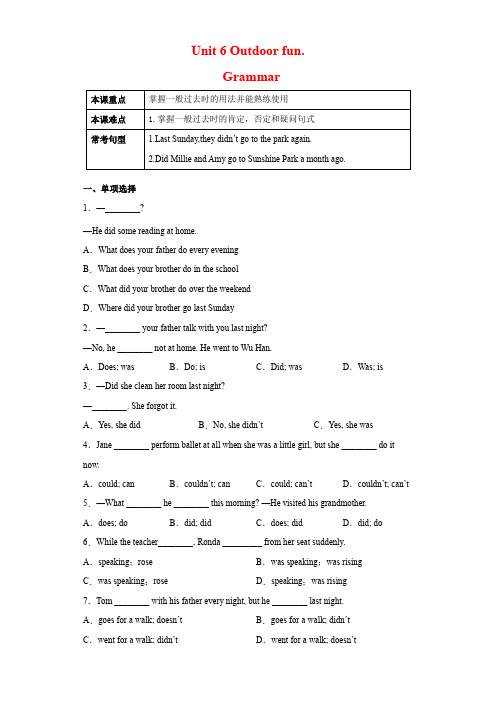
Unit 6 Outdoor fun.Grammar一、单项选择1.—________?—He did some reading at home.A.What does your father do every eveningB.What does your brother do in the schoolC.What did your brother do over the weekendD.Where did your brother go last Sunday2.—________ your father talk with you last night?—No, he ________ not at home. He went to Wu Han.A.Does; was B.Do; is C.Did; was D.Was; is 3.—Did she clean her room last night?—________. She forgot it.A.Yes, she did B.No, she didn’t C.Yes, she was 4.Jane ________ perform ballet at all when she was a little girl, but she ________ do it now.A.could; can B.couldn’t; can C.could; can’t D.couldn’t; can’t 5.—What ________ he ________ this morning? —He visited his grandmother. A.does; do B.did; did C.does; did D.did; do 6.While the teacher________, Ronda _________ from her seat suddenly. A.speaking;rose B.was speaking;was risingC.was speaking;rose D.speaking;was rising7.Tom ________ with his father every night, but he ________ last night.A.goes for a walk; doesn’t B.goes for a walk; didn’tC.went for a walk; didn’t D.went for a walk; doesn’t8.— ________ Carol ________ any photos in the park?—Yes, she did.A.Does; take B.Did; took C.Did; take 9.—Look at my new smart phone.—Wow. it’s so cool! When and where _________ you _________ it?A.do; buy B.have; bought C.did; buy 10.—You can’t swim in the river. It’s dangerous.—Sorry, I ________ see the sigh “No swimming”.A.don’t B.didn’t C.doesn’t D.won’t 11.— When ________ your father at work?— The day before yesterday.A.is B.did C.was12.________ your mother ________ a meeting last Friday?A.Does; have B.Did; have C.Did; has 13.—Did you visit the Great Wall last year?—________. But we visited the Palace Museum.A.Yes, we do B.No, we didn’t C.Yes, we did D.No, we don’t 14.—Where ________ you yesterday?—I was in the library.A.are B.were C.was D.be15.I ________ play in the park ________ I was a little girl. I really miss my happy days there.A.used to; after B.didn’t use to; when C.didn’t use to; after D.used to; when 16.—________ you study for the test last night?—Yes, and I studied very hard to get good grades this time.A.Do B.Did C.Are D.Does 17.—You can’t park your car here. Can’t you see the sign?—I am sorry. I _______ see it just now.A.won’t B.don’t C.didn’t D.wasn’t 18.—I ________ a good breakfast this morning.—Neither ________ I. Let’s go and buy some snacks.A.hadn’t; had B.didn’t have; had C.didn’t have; did D.hadn’t; did19.My sister _________ sing any English songs two years ago, but now she ________ do it very well.A.can’t; can B.couldn’t; can C.can’t; could D.couldn’t; could 20.—_______?—I camped by the lake with friends.A.How was your summer vacationB.Where do you goC.What did you do last weekend21.— Look at the sign , “No Photos”.— Sorry, I ________ see it.A.don’t B.didn’t C.can’t22.The People’s Park is ___________ I __________ her for the first time.A.where, meet B.when, met C.where, met D.when, meet 23.—Excuse me, what time ________ the concert ________?—Well, in fact you’re twenty minutes late. It ________ at eight o’clock sharp. A.did…begin; began B.does…begin; began C.did…begin; has begun D.does...begin; begins24.— ________ you ________ any better today, young lady?— Yes, thank you, Doctor Mason. It ________ as much as it ________ yesterday. A.Are...feeling; doesn’t hurt; did B.Are…feeling; hurts; hurt C.Do...feel; wasn’t hurt; hurt D.Do...feel; hurts; did25.—Mr. Green, ________ you ________ the Happy Valley last Sunday?—No, but I’ll visit it next week.A.will; go to B.did; went to C.did; go to D.did; gone to 26.—Did your friends and you hear what the guide said in the museum?—________. We were busy talking with each other at that time.A.Yes, we were B.No, we weren’t C.Yes, we did D.No, we didn’t 27.—________ you go to your grandparents’ home every weekend, Lucy?—Yes, and I ________ chickens there last weekend.A.Do; feed B.Do; fed C.Did; feed D.Did; fed 28.—My mother said you went on a Silk Road trip last year.—Yes, it ________ a wonderful trip.A.weren’t B.was C.will be D.were 29.—________ you stay at home last Sunday afternoon?—No, I ________ a kite with my friends in the park.A.Do; fly B.Were; flew C.Did; flew D.Did; fly 30.you to the park six hours ago?A.Did; went B.Did; go C.Will; go二、句型转换31.Mr. Wang went to Canada two years ago. (对画线部分提问)________ ________ Mr. Wang go to Canada ?32.Jim read a newspaper just now.(对划线处提问)________________ Jim read just now?33.My father had a fever last week. (对划线部分提问)________________________ last week?34.Their friend played on the playground the day before yesterday.(变为一般疑问句)________ their friend _______ on the playground the day before yesterday?35.The little boy often buys some flowers for his mother. (用上last Sunday,把句子改写为否定句)The little boy _________________ any flowers for his mother last Sunday.36.They went to Shanghai this morning. (改为一般疑问句)________ they ________ to Shanghai this morning?37.He went to the park last year. (改为否定句)He ________ ________ to the park last year?38.He did his homework at home last weekend.(改为否定句)He ________________ his homework at home last weekend.39.Lucy read English yesterday morning. (改为否定句)Lucy ________ ________ English yesterday morning.40.Mary went to London for a study trip last summer. (改为一般疑问句)________ Mary ________ to London for a study trip last summer?41.Bob did some exercise this morning. (改为一般疑问句)_______ Bob _______ any exercise this morning?42.The book cost him seven dollars. (改为一般疑问句)________ the book ________ him seven dollars?43.Nacy did her homework last night. (改为否定句)Nacy ____________ ____________ her homework last night.44.The new house cost Mr. Smith a lot of money.(改为否定句)The new house ________ ________ Mr. Smith much money.45.I felt tired after working for more than 10 hours yesterday. (改为否定句)I ___________ ___________ tired after working for more than 10 hours yesterday.参考答案:1.C【解析】句意:——你哥哥周末做了什么?——他在家看书。
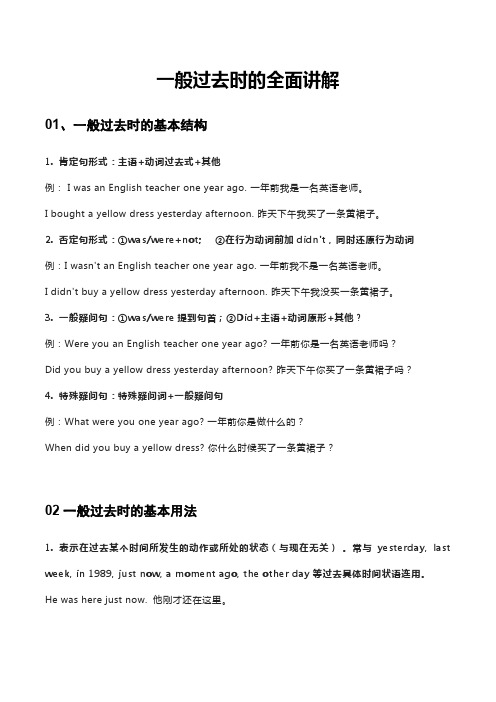
一般过去时的全面讲解01、一般过去时的基本结构1. 肯定句形式:主语+动词过去式+其他例: I was an English teacher one year ago. 一年前我是一名英语老师。
I bought a yellow dress yesterday afternoon. 昨天下午我买了一条黄裙子。
2. 否定句形式:①was/were+not; ②在行为动词前加didn't,同时还原行为动词例:I wasn't an English teacher one year ago. 一年前我不是一名英语老师。
I didn't buy a yellow dress yesterday afternoon. 昨天下午我没买一条黄裙子。
3. 一般疑问句:①was/were提到句首;②Did+主语+动词原形+其他?例:Were you an English teacher one year ago? 一年前你是一名英语老师吗?Did you buy a yellow dress yesterday afternoon? 昨天下午你买了一条黄裙子吗?4. 特殊疑问句:特殊疑问词+一般疑问句例:What were you one year ago? 一年前你是做什么的?When did you buy a yellow dress? 你什么时候买了一条黄裙子?02一般过去时的基本用法1. 表示在过去某个时间所发生的动作或所处的状态(与现在无关)。
常与yesterday, last week, in 1989, just now, a moment ago, the other day等过去具体时间状语连用。
He was here just now. 他刚才还在这里。
What did you do yesterday? 你昨天做了什么事?2. 在过去一段时间内的经常性或习惯性动作。
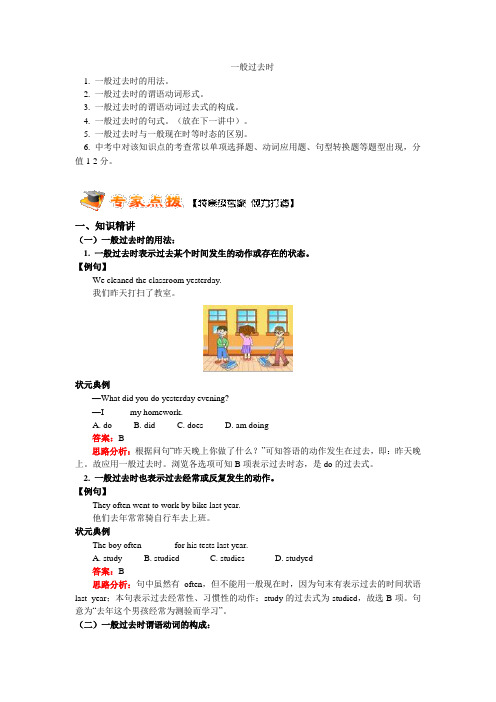
一般过去时1. 一般过去时的用法。
2. 一般过去时的谓语动词形式。
3. 一般过去时的谓语动词过去式的构成。
4. 一般过去时的句式。
(放在下一讲中)。
5. 一般过去时与一般现在时等时态的区别。
6. 中考中对该知识点的考查常以单项选择题、动词应用题、句型转换题等题型出现,分值1-2分。
一、知识精讲(一)一般过去时的用法:1. 一般过去时表示过去某个时间发生的动作或存在的状态。
【例句】We cleaned the classroom yesterday.我们昨天打扫了教室。
状元典例—What did you do yesterday evening?—I _____ my homework.A. doB. didC. doesD. am doing答案:B思路分析:根据问句“昨天晚上你做了什么?”可知答语的动作发生在过去,即:昨天晚上。
故应用一般过去时。
浏览各选项可知B项表示过去时态,是do的过去式。
2. 一般过去时也表示过去经常或反复发生的动作。
【例句】They often went to work by bike last year.他们去年常常骑自行车去上班。
状元典例The boy often_______ for his tests last year.A. studyB. studiedC. studiesD. studyed答案:B思路分析:句中虽然有often,但不能用一般现在时,因为句末有表示过去的时间状语last year;本句表示过去经常性、习惯性的动作;study的过去式为studied,故选B项。
句意为“去年这个男孩经常为测验而学习”。
(二)一般过去时谓语动词的构成:一般过去时有两种谓语动词:1. 系动词be,构成的肯定句式为:主语+was/ were +其他【例句】He was at home yesterday. 昨天他在家。
Lucy and Lily were in the library last night. 露西和莉莉昨晚在图书馆。

一般现在时1. 一般现在时的基本用法:1) 经常性或习惯性的动作,常与表示频率副词的时间状语连用。
时间状语:every morning(afternoon, Sunday), sometimes, on Sunday, often, usually等.例如:I wake up at six O’clock every morning.My friends often go to the park on Sundays.2) 用于表示客观真理,客观存在,科学事实。
例如:The earth moves around the sun.Tomorrow is Tuesday.3) 用于格言或警句中。
例如:Where there is a will, there is a way.4) 用于表示现在时刻的状态、能力、性格、个性。
例如:I don't want so much.She is a good girl and always help others.My watch is very new。
2. 一般现在时的构成:当主语是第一人称,第二人称或第三人称复数时,谓语动词要用动词原形。
当主语是第三人称单数时,谓语动词要用第三人称单数形式,即动词词尾要加s或es. 例. We have four classes in the morning every day.They work in a big office.She likes singing very much.附注:动词的第三人称单数变化形式分为规则变化和不规则变化两种形式。
1. 规则变化:(1)直接在动词词尾加-s.ask---asks work---works get---gets stay---stays(2)以字母s, x, ch, sh或o结尾的动词,在词尾直接加-es.fix---fixes do---does go---goes pass---passeswatch---watches wash____washes(3)以“辅音字母加“y”结尾的动词,要先变y为i再加-es.try---tries study---studies cry---cries2.不规则变化:be---- is have----has3. 一般现在时的句子转换:变否定句、一般疑问句(1)一般疑问句:当句子中有be动词或情态动词时,则把be动词或情态动词提到主语的前面变成疑问句;否定句:在be动词或情态动词后面加not变成否定句.例:She is a student. I can swim.→Is she a student? →Can you swim?→She is not a student. →I can not swim.(2)一般疑问句:当句子中即没有be动词,也没有情态动词时,则在主语前加助动词do, does 变成问句;否定句:在主语后谓语动词前加助动词don’t, doesn’t变成否定句,助动词后的谓语动词要变成动词原形。
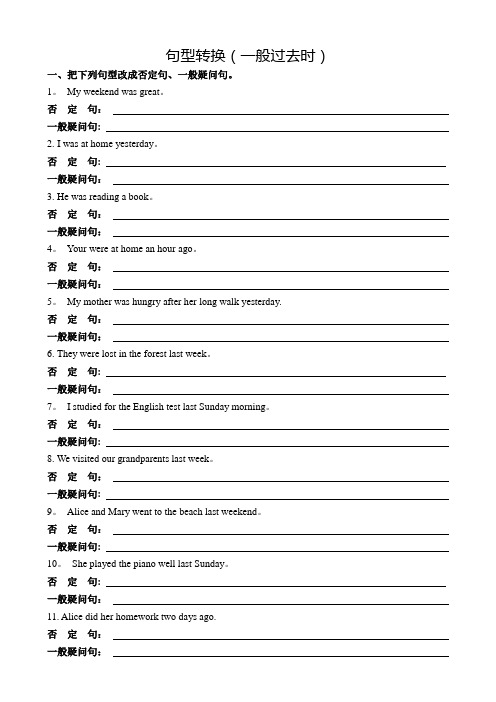
句型转换(一般过去时)一、把下列句型改成否定句、一般疑问句。
1。
My weekend was great。
否定句:一般疑问句:2. I was at home yesterday。
否定句:一般疑问句:3. He was reading a book。
否定句:一般疑问句:4。
Your were at home an hour ago。
否定句:一般疑问句:5。
My mother was hungry after her long walk yesterday.否定句:一般疑问句:6. They were lost in the forest last week。
否定句:一般疑问句:7。
I studied for the English test last Sunday morning。
否定句:一般疑问句:8. We visited our grandparents last week。
否定句:一般疑问句:9。
Alice and Mary went to the beach last weekend。
否定句:一般疑问句:10。
She played the piano well last Sunday。
否定句:一般疑问句:11. Alice did her homework two days ago.否定句:一般疑问句:12。
I helped Lucy with her Chinese just now.否定句:一般疑问句:13。
He did some reading last night.否定句:一般疑问句:14. I cleaned my room yesterday morning.否定句:一般疑问句:二、对划线部分提问。
1. My vacation was great.your vacation?2. I was at home an hour ago?an hour ago?3. He was in the school last year。
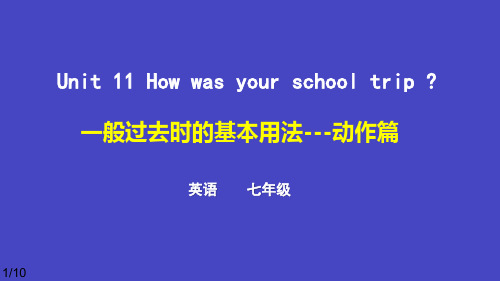

2021年春人教七下一般过去时专项复习与检测一,概述:一般过去时(Simple past tense),其实应该叫,过去一般时。
是初中必考,常考的时态,也是中学生学习的难点。
二,一般过去时表示过去某个时间里发生的动作或状态,常和表示过去的时间状语连用,如:yeterday,last night,in 2000,two days ago 等。
如:He got up at 6:00 yesterday.She was out just now.一般过去时也表示经常或反复发生的动作,常和often,always 等表示频度的时间状语连用。
如:He always worked late at night last year.三,结构:四,关于动词过去式的规则与不规则的构成及发音规则:规则变化:1.2.常见不规则动词过去式:A-A形(原形、过去式同形)改动元音字母型的(改动一个元音字母)A-B型(完全不一样)一般过去时专项练习一,基础训练。
写出下列单词的过去式。
1.look______2.play______3.study_______4.hope_______e______6.arrive______7.cross_______8.listen_______9.watch_______10.fight_____ 11.relax_______12.follow_________13.save________14.shop________15.cook_______16.visit_______17.turn_______18.climb______19.enjoy____ 20.answer_______21.pick______22.stay______23.shout______24.move____ 25.sing_____26.swim______27.tell______28write______29make_______ 30.get_____31.run______32.ride________33.drive_______34.leave_______ 35.wear_______36.bring_______37.go______e______39.read______ 40.feel_______41.keep______42.sleep______43.forget________44.cut_____ 45.drink_______46.sit______47.pay_______48.spend_______49.put_______ 50.blow_______51.feed_______52.grow_______53.hear______54.fly_______ 55.wake________二,根据括号中单词的适当形式填空。

七年级英语句型转换练习题及答案1. 一般疑问句转换成陈述句:Did they go to the park? → They went to the park.Do you like basketball? → You like basketball.2. 直接引语转换成间接引语:She said, "I am going to the movies." → She said that she was going to the movies.He asked, "Do you have any siblings?" → He asked if I had any siblings.3. 否定句转换成肯定句:She doesn't play the piano. → She plays the piano.They don't like apples. → They like apples.4. 一般现在时转换成一般过去时:I study English every day. → I studied Englis h every day.She goes to school by bus. → She went to school by bus.5. 一般过去时转换成一般将来时:They visited their grandparents last week. → They will visit their grandparents next week.He went to the library yesterday. → He will go to the library tomorro w.6. 现在进行时转换成一般现在时:They are playing soccer. → They play soccer.She is studying in the library. → She studies in the library.7. 一般将来时转换成一般现在时:We will travel to Japan next month. → We travel to Japan every month.He will finish his homework later. → He finishes his homework later.8. 定义性从句转换成非定义性从句:The book that is on the table is mine. → The book on the table is mine.The girl who is wearing a red dress is my friend. → The girl wearing a red dress is my friend.9. 反意疑问句转换成陈述句:You don't like ice cream, do you? → You don't like ice cream.He isn't coming to the party, is he? → He isn't coming to the party.10. 选择疑问句转换成陈述句:Would you like tea or coffee? → You would like tea or coffee.Can we go to the park or the movies? → We can go to the park or the movies.以上是七年级英语句型转换练习题及答案,希望对你的学习有所帮助。

英语时态汇总一般现在时定义一般现在时表示现在经常反复发生的动作、存在的状态或习惯性的动作..即描述我们日常生活中的衣食住行等活动..用法(1)在实际应用中;一般现在时常与以下时间状语联用:always; usually; often; sometimes; seldom; never;every week day; year; month; once a week; on Sundays ……例句:He usually plays football on Sundays.2没有时间状语;可以分以下四种类型:这一类型由be动词+名词、形容词、副词、代词、数词或介词短语等一起构成谓语;表示主语的个性、特征或状态..这时I 用am.. you;we;they 复数用 are ..he; she ;it ;单数用is如:①I am a student.主语+be动词+名词②They are hungry.主语+be动词+形容词③He is out.主语+be动词+副词④That pen is mine.主语+be动词+代词do型由行为动词充当谓语;表示经常性或习惯性的动作;其构成:主语是: I;you;we.they;复数肯定句:I;you;we.they;复数+动词原形+其它否定句:I;you;we.they;复数+don’t+动词原形+其它一般疑问句:Do +主语+动词原形+其它肯定回答:Yes; 主语+do. 否定回答:No; 主语+ don’t.主语是: he; she; it ;单数肯定句:He; she; it ;单数+动词第三人称单数形式+其它否定句:He; she; it ;单数+doesn’t +动词原形+其它一般疑问句:Does+ he; she; it ;单数+动词原形+其它肯定回答:Yes; 主语+does. 否定回答:No; 主语+ doesn’t.there be型句子表示“某地存在…”;;表示客观事实..用法遵循;即主语是单数或并列主语中的第一个主语是单数;则用there is;主语是复数或并列主语中的第一个主语是复数;则用there are..如:1There is an eraser on the teacher's desk.主语an eraser是单数 2There is an orange;five apples and eight bananas in the bag.并列主语中的第一个主语an orange是单数;情态动词和动词原形一起构成谓语;表示说话人对所叙述的动作或状态的看法..如:①He can speak a little English.can+speak②May I have a book; pleasemay+have练习一、用所给词的适当形式填空..Be动词1. Jim __________be a hard-working student at school.2. __________be Tom and Sam in the same class3. Your school life __________be very interesting.4. There __________be a pen; two rulers and some books on the desk.5. The boys __________be very friendly to me.6. Maria __________be not from the7. __________be there any trees and a pool in the yard8. I want to __________be a teacher.9. Mr. Wang can’t __________be at home; because the lights areoff.10. Don’t __________be late for school again.二、用所给词的适当形式填空..情态动词1. My mom can __________cook food well.2. Must she __________stay at home now3. What can the boy __________do for his parents4. Tom can’t __________sing an English song.5. He may __________perform ballet at Kangkang’s birthday party.6. She should __________help her parents do some housework.三、用所给词的适当形式填空..实义动词1. Tom often __________take a talk after supper.2. Tom and I usually __________go to school by bike.3. Does Lin Tao __________like reading storybooks4. What classes do you __________have today5. How often does the girl __________watch TV6. Where do they __________live now7. Every year many people __________lose their lives in trafficaccidents.8. Sam doesn’t __________get up early in the morning.9. Each of them __________have a nice schoolbag.10. They each __________sleep late at night.四、句型转换..Be动词1. She is in a blue dress.变否定句She __________ __________ a blue dress.2. I am from Qijiang.变一般疑问句__________ __________ from Qijiang3. Are the storybooks very interesting否定回答No; __________ __________.4. His parents are both workers.变一般疑问句__________ his parents __________ workers5. There are some nice books on the shelf.对划线部分提问__________ __________ on the shelf五、句型转换..情态动词1. My mother may speak a little English.变否定句My mother __________ __________ speak a little English.2. We should be careful when we cross the street.变一般疑问句__________ __________ be careful when we cross the street3. Must I finish my homework at once作肯定和否定回答Yes; __________ __________.No; __________ __________.4. Tom can recite a Chinese poem.对划线部分提问What __________ Tom __________六、句型转换..实义动词1. They often play the piano loudly.变否定句They __________ often __________ the piano louldy.2. Jim learns English well.变一般疑问__________ Jim __________ English well3. She likes Sichuan food very much.对划线部分提问What __________ she __________ very much4. Do the boys usually play football after school作肯定回答 Yes;________ ;__________.5. She usually does some cooking in the evening.变否定句She usually __________ __________ any cooking in the evening.6. I want to do some shopping.变一般疑问句__________ you __________ to do any shopping7. Tom often wathes TV at night.对划线部分提问What __________ Tom often __________ at night8. They sometimes go swimming in the afternoon.对划线部分提问What __________ they sometimes __________ in the evening现在正在进行时定义现在正在进行时表示说话的瞬间正在进行或发生的事情..标志词:now; look; listen;right now;at the/this moment;at+钟点结构主语+ beam / is / are+动词的-ing形式..首先分析划线部分的意思;确定用哪个疑问词what; where; who; when; which; whose; how; how many; how much; what shape; whatcolour; what … doing; where … going; what … do;然后再将原句变为一般疑问句形式即将be动词提到主语之前;其余的不变..如:What time is Tom readingread an interesting story book Where are they takingtake pictures现在正在进行时常与一些固定的时间短语搭配使用:①now“现在”如: Jim is playing soccer now.②Look Listen “看啊听啊”如:Look Mr. on the computer.right now= at the moment“此刻”如:trees at the momnet.③Where is…问题的回答;暗指说话的时候..如:—Where is your mom; Tom—④前面早就阐明是现在的短文中..练习一、用所给词的适当形式填空..1. My parents ____________watchTV now.2. Look. Three boys ___________run.3. What _______ your mother ___________donow4. _______ your dog ___________ nowsleep5. _______ you ___________listento music Yes; I am.6. Look; Miss Chen ___________ football.play7. Tom and his sister ___________waitfor you over there.8. Now Class 3 and Class 4___________havea test.9. Listen; someone ___________singin the classroom.10. ——Where is Zhang Yan——She ___________talkwith her teacher in the teacher’s office.11. The boy ___________ _____________ drawa picture now.12. Listen .Some girls __________ ____________ singin the classroom .13. My mother __________________ cut some bread now.14. What _________ you __________ do now15. Look. They __________________ have an English lesson .16. They __________ _________not ;play basketball now.17.Look the girls __________ _____________dance in the classroom .18.What is our grandmother doing She _______________watch TV.19. It’s 5 o’clock now. We _________ ___________havesupper now20. The cats run in the garden now.二、句型转换..1. Look Lily is dancing.改为一般疑问句________________________________________________2. Kate is looking for her watch.改为否定句________________________________________________3. Mrs White is watching TV.对划线部分提问________________________________________________4. I am doing homework.改为否定句________________________________________________5. They are waiting for you at the library.就划线部分提问__________________________________________________三、根据中文提示完成句子:1. 小花不是在写作业;她在画画..Xiao Hua ____________ _________ homework. She _________ _________ pictures.2. 今天李老师穿着一件红色的连衣裙..Miss Li _________ _________ a red dress today.3. 你爷爷在看报纸吗_________ your grandpa _________ the newspaper4. Tom和Jim在做什么_________ _________ Tom and Jim _________5. 他们是在打篮球还是在打排球_________ they ________ basketball _________ volleyball一般现在时、现在进行时综合练习一、写出下列动词的三单形式和现在分词三单现在分词三单现在分词三单现在分词三单现在分词buy _______ _______ fly _____ _______ plant ______ _______ study ______ _______drink _____ ______ play_____ _______ go ______ _______ make ______ _______do _______ ______ dance ______ ______ worry ______ _______ ask_______ _______taste _____ ______ eat ___ ___ ___ __ read ______ _ _ put ________ ________let ______ ______ run _______ _______ keep _____ _______ have ______ ________find _____ ______ get ___ ___ ___ _ eat ______ ___ ___ ring _______ ________write_____ _______ sleep _______ _______ give _____ _______ stop ______ _______二. 用正确的动词形式填空1.The children are ___________ run there now.2.-I ________ up at half past six this morning. get-My father always __________come back from work very late.3.Listen Who__________sing in the music room Oh. Mary _______singthere.4.- ______ you _________ have any color pens -Sorry; I don’t haveany.5.She likes eggs; but she __________________ not like bread.6.My mother tell me a story every night.–7.–How much meat ________ you ___________ want - A kilo; please.8.Someone __________ be in the next room.9.There __________ be a pen and two erasers in the pencil- box.10.You must _________ get here at two this afternoon.11.We must __________ help the teacher carry it.12.Who __________ teach you English in your school13.The teacher is busy. He only __________ sleep five hours a day.14.Look The bus ____________________ come.15.She _____ go to school from Monday to Friday.16.What _______ he _________ like17.He __________ teach English in a middle school.18.You always do your homework well.19.– What ________ she ___________ do-She _________ ______________ clean her room now.20.Look at the man. He __________________ drink tea.21.He can ___________ sing this song.22.Let’s ___________ help my mother ___________ cook.23.I think Li Lei must ______________ be at school.24.There __________ be some bread and meat on the table.25.Listen She __________ sing an English song.26.Liu Ying _______________ study in Beijing these days.27.They _____________________ clean the floor now.28.Look He ___________________ drink tea.29.Han Meimei often ____________ play games after school.30.What __________ the girls __________ do over there now31._______ your sister ________ know English41.Where _______ your pen pal ______ come from42.The boy is ___________ watch TV at home.43. Su Hai ______ have eight lessons this term.45.___________ be you sitting and drinking tea46.One of the people __________ be singing.47.What are they doing They _____________ clean the room.49.Look Lucy ____________ fly a kite with Lily.50.I can ___________ speak Chinese and English.51.How _________ you _________ do52.She ____________ look like her mother.53.I ___________ not think so.54.My friends _____________ play cards now.55.Listen Who _____________ sing in the classroom56.Jim ___________ have a good friend.57.Where ___________ do your friend come from60.She ___________ live in the city.62.Class One _________ have a map of China.63.Mr Green ___________ teach them English every day.64.The little girl __________ have a round face.67.The music __________ sound very great.68.She _______________ not like opera.69.Tom often _____________ sing Japanese songs.70.Jack and I often __________ swim in the river.71. What ______ she _______ do at weekends72. My cousin walk to school every day.74. They ____________ not/water the flowers now.75. —______ Helen ____________ wash clothes —Yes; she is.78. -What day _____ be it today -It’s Saturday.79.. My father always __________come back from work very late.80. Where __________ you __________ have lunch every day82.What are you _________do now I ___________eat bread.73. It’s nine o’clock. My father_______________work in the office.84. Look; the boy______________put the rubbish into the bin.85. ____________he____________clean the classroom No; he isn’t. He____________play.86. Where is Mak He___________run on the grass.三. 句型转换3. The twins go to school on foot every day. 同上_________ the twins _______ to school on foot every day5. She is going to shopping tomorrow. 变否定句_____________________________6. My mother likes her students. 变一般疑问句____________________ 13. Mary usually plays games with her grandparents.否定句:Mary usually _______ ________ games with her grandparents.一般疑问句:______ Mary usually ________ games with her grandparents 特殊疑问句: Mary usually14. They are doing their homework.否定句:They ______ ________ their homework.一般疑问句:______ they ________ their homework特殊疑问句:______ ______ they _______15. Mary does her homework well.否定句:Mary her homework well.一般疑问句:Mary her homework well16. I sometimes write to my mother in the evening.用tonight改写句子I to my mother tonight.四、单句改错1.Does he enjoys listening to music2.The boy has a party at home now.3.He spends much time reading book last weekend.4.Linda can helps his mother clean the room.5.Someone are looking at you.一般过去时定义一般过去时表示过去某个时间发生过了的动作或存在过的状态..即描述已经发生过了的事情..时间标志性词yesterday;the day before yesterday; in 2010; three days ago; last night; month; year; weekend; just now; 另一般过去时也表示经常或反复发生的动作;常和often; always等表示频率的时间状语连用..例如:I always went to school on foot last year. 去年我通常走路去上学..用法这一类型由be动词was和were+名词、形容词、副词、代词、数词或介词短语等一起构成谓语;表示主语以前或过去的个性、特征或状态..如:was a student ten years ago.主语+be动词+名词were hungry just now.主语+be动词+形容词was under the tree yesterday.主语+be动词+介词短语④It was rainy last Sunday.very happy at Kangkang’s birthday party.did型由行为动词过去式充当谓语;表示以前做过的某事;其构成为“主语+动词过去式动词”..如:①him when I was young me at that time .there be型句子表示“某地曾经存在…”;其构成为“there bewas/were+主语+其他”..用法遵循“就近原则”;情态动词型句子的构成为“主语+情态动词过去式could+动词原形”;情态动词过去式和动词原形一起构成谓语;表示主语过去或曾经能做的事情..如:①He could speak a little English last year.could+speak②What could she do when he was ten.练习一、用所给词的适当形式填空..Be动词1. I __________be a little girl at that time.2. When __________be you born3. Maria __________be born in Cuba.4. The weather yesterday __________be very cold.5. They __________be very happy at Kangkang’s birthday partyyesterday.6. What __________be the date the day before yesterday7. __________be you at home a moment ago8. Where __________be your parents last Saturday9. My mother __________be not in Chongqing last month.10. How __________be the weather this morning二、用所给词的适当形式填空..情态动词1. Jane __________can speak Chinese well when she was only five.2. __________can they dance the disco last year3. I __________can not sleep well last night.4. What __________can you do just now三、用所给词的适当形式填空..实义动词1. I __________like reading books before. But now I don’t.2. She __________watch TV late yesterday evening.3. We __________clean up our classroom a moment ago.4. __________ they __________have any bread this morning5. What __________ you __________do the day before yesterday6. Tom __________go to visit the Great Wall last year.7. Mr. Wang __________sing an English song just now.8. __________ Lin Tao have a good time at the party last Sunday9. We __________not porform ballet yesterday. We __________recitea poem.10. The wind yesterday __________blow strongly.四、句型转换..Be动词1. I was born in a small town.变为一般疑问句__________ you __________ in a small town2. Sam was a little boy at that time.变为否定句Sam __________ __________ little boy at that time.3. His friends were in the library just now.对划线部分提问__________ __________ his friends just now4. Were they very happy yesterday作否定回答No; __________ __________.5. Was your brother born in Chongqing作肯定回答Yes; __________ __________.五、句型转换..情态动词1. I could sing English songs when I was five.变一般疑问句__________ you __________ English songs when you were five2. The boy could ride a bike last year.变否定句The boy __________ __________ a bike last year.3. They could play a game yesterday.对划线部分提问What __________ they __________ yesterday4. Could your friends cook food last Sunday作肯定回答Yes; __________ __________.六、句型转换..实义动词1. I went to Sichuan with my friends during summer holidays.变否定句I __________ __________ to Sichuan with my friends during summer holidays.2. She recited a poem at Kangkang’s birthday party.变一般疑问句__________ she __________ a poem at Kangkang’s birthday party 3. They did their homework half an hour ago.变否定句They __________ __________ their homework half an hour ago.4. Tom sang a song beautifully yesterday.对划线部分提问What __________ Tom __________ yesteray5. Jim took many pictures in winter holidays.变一般疑问句__________ Jim __________ many pictures in winter holidays 6. Did the kid hurt himself just now做否定回答No; __________ __________.7. They knew the girl in blue well对划线部分提问Who __________ they __________ well8. I forgot to close the door yesterday evening.对划线部分提问 What __________ you __________ to do yesterday evening。

一般现在时和一般过去时的句型转换1. 生活中的小故事生活中,我们常常需要用不同的时态来表达事情,今天就聊聊一般现在时和一般过去时的那些事儿。
就比如说,你每天早上都喝咖啡,对吧?你可以说:“我每天都喝咖啡。
”这是一般现在时,简单明了。
可是,回想一下,上个月的那个星期六,你去咖啡店时,可能会说:“我那天喝了咖啡。
”这就变成了一般过去时。
看到没,这种转换就像魔术一样,轻而易举!1.1. 早晨的咖啡时光想象一下,一个阳光明媚的早晨,你懒洋洋地躺在床上,心里想着:“我总是喜欢在早晨喝一杯热腾腾的咖啡。
”这是一种习惯,反映了你的一般现在时。
可是一转眼,时光倒流,回到上个月,那时候你可真是被咖啡圈了个彻底:“上个月我在新开的咖啡店喝了一杯超好喝的拿铁。
”说到那杯拿铁,真的是香气四溢,瞬间把我拉回到那个瞬间。
想想现在的自己,一杯咖啡在手,简直是人生的赢家,哈哈!1.2. 每天的跑步计划再说说运动,哦,运动这事儿。
你可能会说:“我每天早上都去跑步。
”这是个健康的习惯啊,大家都应该学学!可是回想一下,上个星期日,你就得改口:“我上个星期日去跑了十公里!”这时候的你,脸上肯定挂着得意的笑容,仿佛刚刚完成了一项伟大的壮举,心里想着:“我真是太棒了!”一想到这些,立刻充满了动力,想要继续努力!2. 生活中的变化生活中,总是充满了变化。
现在的你也许正在学习新东西:“我现在正在学吉他。
”可是,想想去年,你可能会说:“去年我学了一整年的吉他。
”这种时态的变化就像一个时间的漩涡,把你带回到过去,又拉回现在。
这种对比,真是让人感慨万千。
2.1. 学习的乐趣想想现在,可能你在乐队里练习:“我现在和我的朋友们一起排练。
”可是,上个学期,你可得说:“上个学期我们常常一起排练。
”那种团结的气氛,真是让人怀念。
一起挥洒汗水,一起欢笑,生活中能有这样的伙伴,真是太幸福了。
学吉他不仅仅是技术上的提升,更是和朋友们一起享受音乐的乐趣!2.2. 饮食的变化再说到饮食习惯。
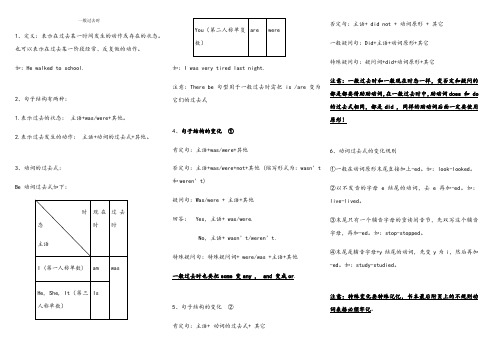
一般过去时1、定义:表示在过去某一时间发生的动作或存在的状态。
也可以表示在过去某一阶段经常、反复做的动作。
如:He walked to school.2、句子结构有两种:1.表示过去的状态:主语+was/were+其他。
2.表示过去发生的动作:主语+动词的过去式+其他。
3、动词的过去式:Be 动词过去式如下:如:I was very tired last night.注意:There be 句型用于一般过去时需把 is /are 变为它们的过去式4、句子结构的变化①肯定句:主语+was/were+其他否定句:主语+was/were+not+其他 (缩写形式为:wasn’t和weren’t)疑问句:Was/were + 主语+其他回答: Yes, 主语+ was/were.No, 主语+ wasn’t/weren’t.特殊疑问句:特殊疑问词+ were/was +主语+其他一般过去时也要把some 变any , and 变成or.5、句子结构的变化②肯定句:主语+ 动词的过去式+ 其它否定句:主语+ did not + 动词原形 + 其它一般疑问句:Did+主语+动词原形+其它特殊疑问句:疑问词+did+动词原形+其它注意:一般过去时和一般现在时态一样,变否定和疑问的都是都要借助助动词,在一般过去时中,助动词does 和 do的过去式相同,都是did , 同样的助动词后面一定要使用原形!6、动词过去式的变化规则①一般在动词原形末尾直接加上-ed。
如:look-looked。
②以不发音的字母e结尾的动词,去e再加-ed。
如:live-lived。
③末尾只有一个辅音字母的重读闭音节,先双写这个辅音字母,再加-ed。
如:stop-stopped。
④末尾是辅音字母+y结尾的动词,先变y为i,然后再加-ed。
如:study-studied。
注意:特殊变化要特殊记忆,书本最后附页上的不规则动词表格必须牢记。
一、写出下列动词的过去式。
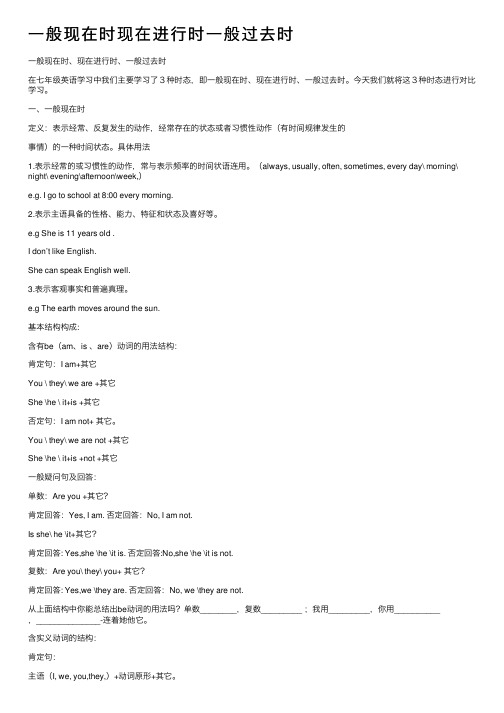
⼀般现在时现在进⾏时⼀般过去时⼀般现在时、现在进⾏时、⼀般过去时在七年级英语学习中我们主要学习了3种时态,即⼀般现在时、现在进⾏时、⼀般过去时。
今天我们就将这3种时态进⾏对⽐学习。
⼀、⼀般现在时定义:表⽰经常、反复发⽣的动作,经常存在的状态或者习惯性动作(有时间规律发⽣的事情)的⼀种时间状态。
具体⽤法1.表⽰经常的或习惯性的动作,常与表⽰频率的时间状语连⽤。
(always, usually, often, sometimes, every day\ morning\ night\ evening\afternoon\week,)e.g. I go to school at 8:00 every morning.2.表⽰主语具备的性格、能⼒、特征和状态及喜好等。
e.g She is 11 years old .I don’t like English.She can speak English well.3.表⽰客观事实和普遍真理。
e.g The earth moves around the sun.基本结构构成:含有be(am、is 、are)动词的⽤法结构:肯定句:I am+其它You \ they\ we are +其它She \he \ it+is +其它否定句:I am not+ 其它。
You \ they\ we are not +其它She \he \ it+is +not +其它⼀般疑问句及回答:单数:Are you +其它?肯定回答:Yes, I am. 否定回答:No, I am not.Is she\ he \it+其它?肯定回答: Yes,she \he \it is. 否定回答:No,she \he \it is not.复数:Are you\ they\ you+ 其它?肯定回答: Yes,we \they are. 否定回答:No, we \they are not.从上⾯结构中你能总结出be动词的⽤法吗?单数________,复数_________ ;我⽤_________,你⽤__________,______________-连着她他它。

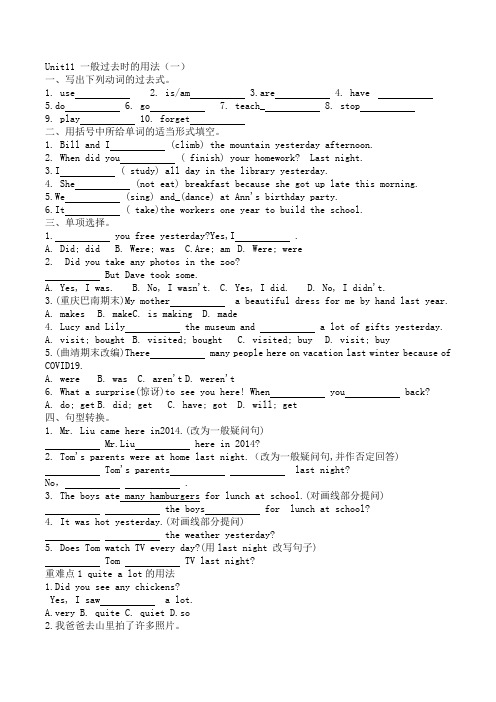
Unit11 一般过去时的用法(一)一、写出下列动词的过去式。
1. use2. is/am3.are4. have5.do6. go7. teach_8. stop9. play 10. forget二、用括号中所给单词的适当形式填空。
1. Bill and I (climb) the mountain yesterday afternoon.2. When did you ( finish) your homework? Last night.3.I ( study) all day in the library yesterday.4. She (not eat) breakfast because she got up late this morning.5.We (sing) and_(dance) at Ann's birthday party.6.It ( take)the workers one year to build the school.三、单项选择。
1. you free yesterday?Yes,I .A. Did; didB. Were; wasC.Are; amD. Were; were2. Did you take any photos in the zoo?But Dave took some.A. Yes, I was.B. No, I wasn't.C. Yes, I did.D. No, I didn't.3.(重庆巴南期末)My mother a beautiful dress for me by hand last year.A. makesB. makeC. is makingD. made4. Lucy and Lily the museum and a lot of gifts yesterday.A. visit; boughtB. visited; boughtC. visited; buyD. visit; buy5.(曲靖期末改编)There many people here on vacation last winter because of COVID19.A. wereB. wasC. aren'tD. weren't6. What a surprise(惊讶)to see you here! When you back?A. do; getB. did; getC. have; gotD. will; get四、句型转换。

名词单复数,一般现在时,一般过去时,现在进行时姓名:________名词单复数:名词变复数规则变化及发音:1、绝大多数的可数名词在词尾加上s :book→books;→ desks;pen→pens;car→cars s 遇t读浊辅音[ts],遇d读清辅音[dz]friend→friends; cat→cats; 2.、以s、x、ch、sh结尾的单词,在该词末尾加上-es;读音规则:读[iz];bus→buses; box→boxes; → watchches; dish→dishes 3、以辅音字母+y结尾的名词,要把y变为i,再加-es;读音规则:读[z]。
fly→flies; baby→b abies; 元音字母加y结尾的单词直接加s;toy →toys;boy→boys;4、以-f或-fe结尾的名词,要将-f或-fe变为-v,再加es;读音规则:读[vz];knife→knives;leaf→leaves;5、以-o结尾的名词,有三个单词要加-es,其余都加-s;读音规则:读[z]。
tomato→tomatoes西红柿; potato→potatoes土豆; hero→heroes 英雄; — Negroes 口诀:“黑人英雄喜欢吃土豆和西红柿”其余zoo→zoos; 名词变复数不规则变化:1.单词内部发生变化:口诀“oo常常变ee,男人女人a变e”foot→feet脚;tooth→teeth牙齿;man→men男人;woman→women女人;2.单复数相同:“羊小鹿无变化,单数复数是一家”sheep→sheep绵羊;fish→fish鱼;deer→deer鹿;3.不规则变化:child→children孩子;mouse→mice老鼠;German→Germans德国人;“某国人”的复数有三种类型:(1)Chinese, Japanese单数复数同形,不需加s;(2)Englishman, Frenchman, Dutchman复数要把 man 变为men;(3)其他各国人以–an, -ian收尾的均直接加s。
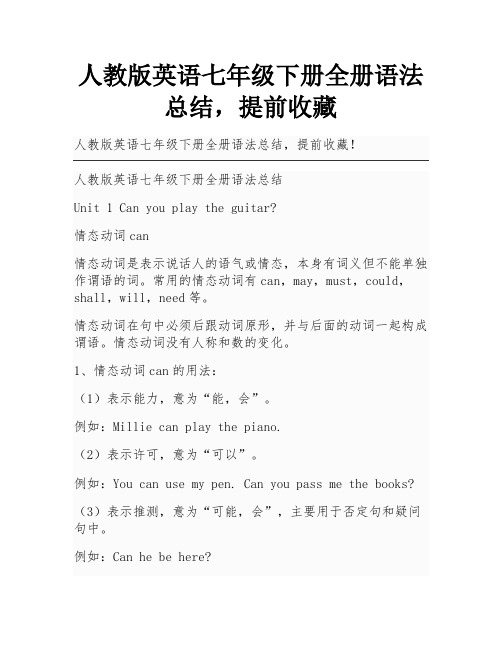
人教版英语七年级下册全册语法总结,提前收藏人教版英语七年级下册全册语法总结Unit 1 Can you play the guitar?情态动词can情态动词是表示说话人的语气或情态,本身有词义但不能单独作谓语的词。
常用的情态动词有can,may,must,could,shall,will,need等。
情态动词在句中必须后跟动词原形,并与后面的动词一起构成谓语。
情态动词没有人称和数的变化。
1、情态动词can的用法:(1)表示能力,意为“能,会”。
例如:Millie can play the piano.(2)表示许可,意为“可以”。
例如:You can use my pen. Can you pass me the books?(3)表示推测,意为“可能,会”,主要用于否定句和疑问句中。
例如:Can he be here?He can’t have finished his homework.Unit 2 What time do you go to school?频度副词英语中常见的频度副词有usually, sometimes, always, often, seldom, never等,它们用来表示动作发生的频率,但是在程度上有所区别,频率由高到低依次是:always>usually>often>sometimes>seldom>never。
频度副词放在be动词、情态动词和助动词之后,实义动词之前,对频率的提问用how often。
He’s always busy.I never play a trick on others.Unit 3 How do you get to school?how, how long和how far引导的特殊疑问句how用来提问方式,表示“如何”;how long用来提问时间,表示“多长时间”;how far用来提问距离,意为“多远”。
